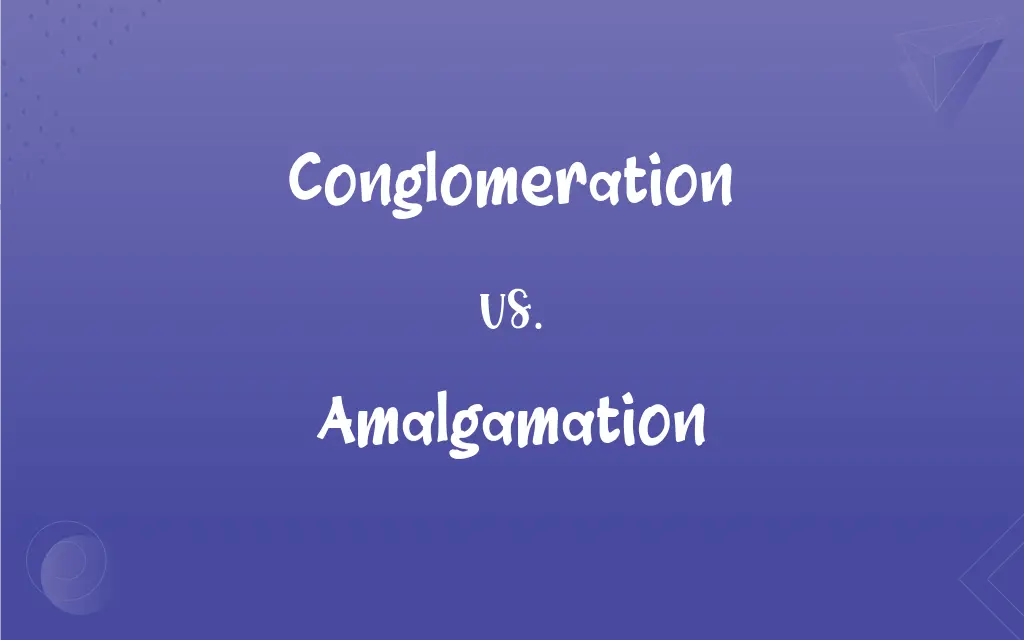Conglomeration vs. Amalgamation: What's the Difference?
Edited by Harlon Moss || By Janet White || Updated on October 2, 2023
Conglomeration refers to a collection of unrelated things; amalgamation is the process of combining different entities into a single form.

Key Differences
Conglomeration and amalgamation are both terms describing collections or combinations, but they differ fundamentally in their nature. A conglomeration is essentially a grouping or collection of different, often unrelated items or businesses. On the other hand, amalgamation denotes the process where different entities, usually companies, combine to form a single new entity.
In the corporate sector, conglomeration refers to a company that consists of diverse and often unrelated businesses or divisions. In contrast, amalgamation in business signifies the legal process by which two or more companies unite to form a single company. Amalgamation often occurs to expand the business reach or to acquire new capabilities, while conglomerations enhance diversification.
In the realm of materials science, conglomeration may refer to the gathering of particles or elements without a chemical bond. In contrast, amalgamation implies a process in which different metals combine, usually with mercury, to form a unified mixture. This comparison shows how amalgamation creates something unified, whereas conglomeration maintains the individuality of its components.
On a more casual note, conglomeration can depict any cluster or collection of various things, like a conglomeration of people or ideas. Conversely, amalgamation can represent the blending of different cultures, ideas, or elements, symbolizing a more integrated and unified mix. Both conglomeration and amalgamation hold significance in different contexts but vary in terms of integration and unity.
When you observe a city skyline, a conglomeration of buildings of different architectures and ages is often visible. However, when looking at the city’s culture, an amalgamation of various traditions, languages, and cuisines becomes apparent, symbolizing unity in diversity. These analogies further elaborate the conceptual divergence between conglomeration and amalgamation.
ADVERTISEMENT
Conglomeration and Amalgamation Definitions
Conglomeration
It can represent a mass or cluster formed by the combination of various elements.
The artwork was a beautiful conglomeration of colors and textures.
Amalgamation
It can represent a mixture or blend of diverse elements.
The dish was an amalgamation of flavors from various cuisines.
Conglomeration
It denotes the action or process of forming such a collection or cluster.
The conglomeration of clouds in the sky forewarned of an upcoming storm.
Amalgamation
Amalgamation is the process of combining or uniting multiple entities into one form.
The amalgamation of the small towns formed a new city.
Conglomeration
Conglomeration is a collection of different, usually unrelated things.
The festival was a conglomeration of various musical genres.
ADVERTISEMENT
Amalgamation
In business, it is a legal process by which two or more companies merge.
The amalgamation of the tech firms resulted in a powerful new corporation.
Conglomeration
In business, a conglomeration refers to a parent company composed of several different, often unrelated companies.
The conglomeration managed diverse industries, from food production to technology.
Amalgamation
The act of amalgamating or the condition resulting from this act.
Conglomeration
It can also describe a gathered assemblage of miscellaneous things.
The museum displayed a conglomeration of artifacts from different civilizations.
Amalgamation
A consolidation or merger, as of several corporations.
Conglomeration
The act or process of conglomerating.
Amalgamation
The production of a metal alloy of mercury.
Conglomeration
The state of being conglomerated.
Amalgamation
The process of amalgamating; a mixture, merger or consolidation.
Conglomeration
An accumulation of miscellaneous things.
Amalgamation
The result of amalgamating; a mixture or alloy.
Conglomeration
That which consists of many previously separate parts.
Amalgamation
(specifically) The production of an alloy of mercury and another metal.
Conglomeration
An instance of conglomerating, a coming together of separate parts.
Amalgamation
(obsolete) The intermarriage and interbreeding of different ethnicities or races.
Conglomeration
The act or process of gathering into a mass; the state of being thus collected; collection; accumulation.
Amalgamation
The act or operation of compounding mercury with another metal; - applied particularly to the process of separating gold and silver from their ores by mixing them with mercury.
Conglomeration
That which is conglomerated; a mixed mass; a hodgepodge.
Amalgamation
The mixing or blending of different elements, races, societies, etc.; also, the result of such combination or blending; a homogeneous union.
Conglomeration
A rounded spherical form
Amalgamation
The combination of two or more commercial companies
Conglomeration
A sum total of many heterogenous things taken together
Amalgamation
It refers to the action or result of combining different aspects.
The song was an intriguing amalgamation of jazz and rock.
Conglomeration
An occurrence combining miscellaneous things into a (more or less) rounded mass
Amalgamation
It can also depict the union of different cultural or social groups.
The community was a harmonious amalgamation of people from different backgrounds.
FAQs
Is amalgamation related to business?
Yes, amalgamation in business refers to the legal process where two or more companies merge to form a new entity.
Is every collection a conglomeration?
Not necessarily; a conglomeration specifically refers to a collection of unrelated or different items.
Can amalgamation refer to cultures?
Yes, amalgamation can refer to the combination of different cultures, traditions, or societies into one.
Is amalgamation a type of mixture?
Yes, amalgamation denotes a mixture or combination where different elements unite to form a single entity.
Does amalgamation create something new?
Yes, amalgamation often results in the creation of a new, unified entity or form from different elements.
Does amalgamation imply unity?
Yes, amalgamation typically implies a form of unity or integration of different entities or elements.
Can conglomeration refer to companies?
Yes, a conglomeration can refer to a company that owns multiple different, often unrelated businesses.
What’s a synonym for amalgamation?
A synonym for amalgamation is merger.
Is a conglomeration permanent?
A conglomeration is not necessarily permanent and can be a temporary collection or assembly of different things.
Does conglomeration involve integration?
Conglomeration involves gathering but not necessarily integrating the individual components.
Can amalgamation occur naturally?
Yes, amalgamation can occur naturally, especially in the context of the combination of different elements or compounds.
What does conglomeration imply?
Conglomeration implies a collection or assembly of different, often unrelated, things or entities.
Is conglomeration diverse?
Typically, a conglomeration is diverse, comprising various unrelated items or entities.
Can conglomeration be used in scientific terms?
Yes, conglomeration can refer to the gathering of particles or elements in scientific contexts.
Is conglomeration synonymous with aggregation?
Conglomeration is similar to aggregation but often involves more diversity and unrelatedness among the components.
Does amalgamation alter the original entities?
Generally, amalgamation alters the original entities, integrating them into a new, unified form.
Can a conglomeration be organized?
A conglomeration can be organized or disorganized, depending on the context.
Can amalgamation involve unrelated elements?
Yes, amalgamation can involve the combination of unrelated elements, resulting in a unified whole.
Is amalgamation reversible?
Amalgamation is not typically reversible, especially when it results in the formation of a new entity or substance.
Can conglomeration occur in nature?
Yes, conglomeration can occur in nature, such as a conglomeration of rocks or debris.
About Author
Written by
Janet WhiteJanet White has been an esteemed writer and blogger for Difference Wiki. Holding a Master's degree in Science and Medical Journalism from the prestigious Boston University, she has consistently demonstrated her expertise and passion for her field. When she's not immersed in her work, Janet relishes her time exercising, delving into a good book, and cherishing moments with friends and family.
Edited by
Harlon MossHarlon is a seasoned quality moderator and accomplished content writer for Difference Wiki. An alumnus of the prestigious University of California, he earned his degree in Computer Science. Leveraging his academic background, Harlon brings a meticulous and informed perspective to his work, ensuring content accuracy and excellence.































































